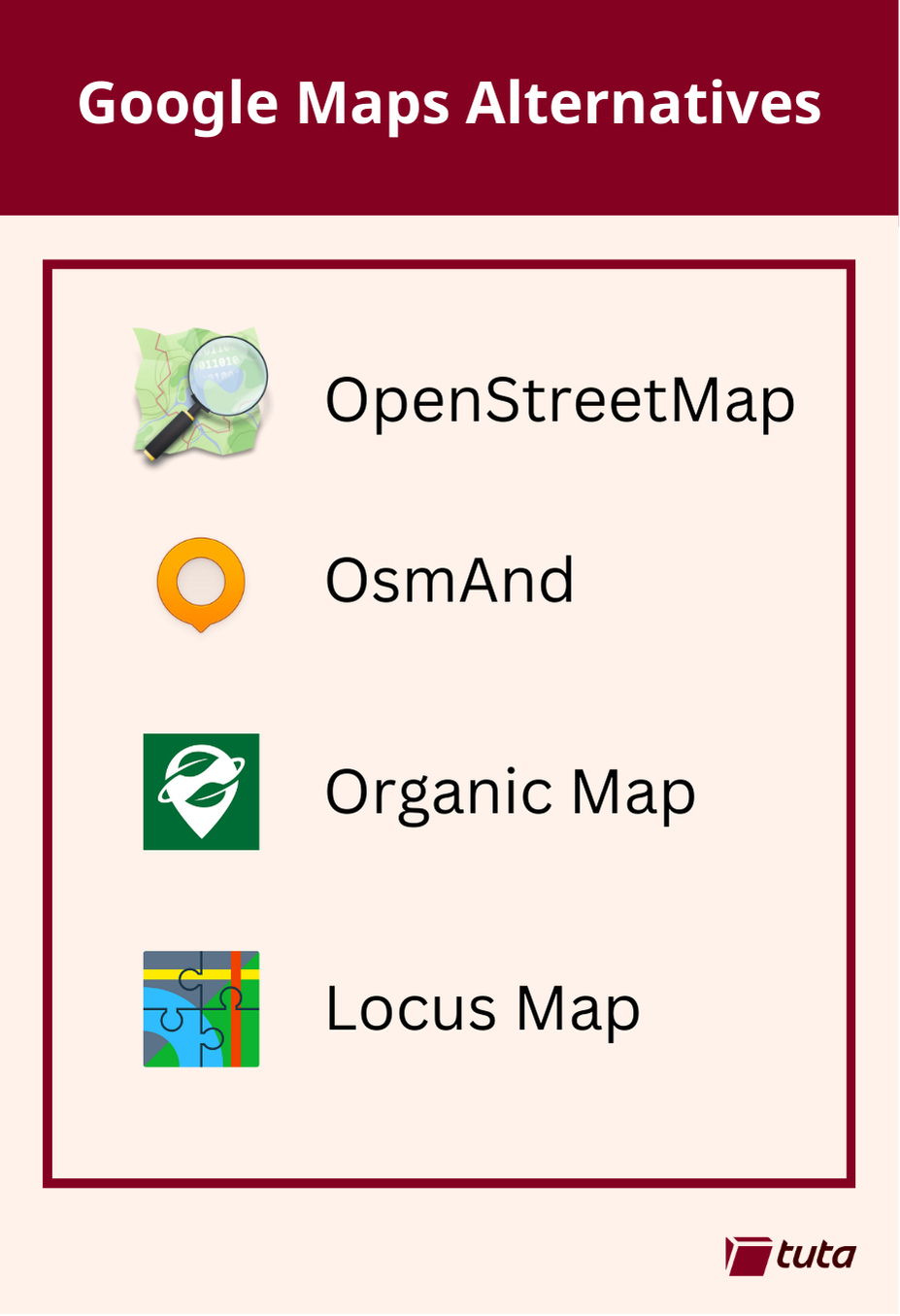- cross-posted to:
- privacy@lemmy.ml
- cross-posted to:
- privacy@lemmy.ml
repeated media reports of Google’s disregard for the privacy of the general public led to a push for open source, community driven alternatives to Google Maps. The biggest contender, now used by Google’s direct competitors and open source projects alike is OpenStreetMap.
- OsmAnd
OsmAnd is a fantastic choice when searching for an alternative to Google Maps. It is available on both Android and iOS devices with both free and paid subscription options. Free accounts have full access to maps and navigation features, but choosing a paid subscription will allow you unlimited map downloads and increases the frequency of updates.
All subscriptions can take advantage of turn-by-turn navigation, route planning, map markers, and all the favorite features you expect from a map and navigation app in 2024. By making the jump to a paid subscription you get some extra features like topo maps, nautical depths, and even point-of-interest data imported from Wikipedia.
- Organic Maps
Organic Maps is a great choice primarily because they offer support for all features of their iOS and Android apps completely offline. This means if you have an old phone laying around, you can install the app, download the maps you need and presto! You now have an indepth digital map in the palm of your hand without needing to worry about losing or damaging your primary mobile device when exploring the outdoors.
Organic Maps tugs our heartstrings by their commitment to privacy. The app can run entirely without a network connection and comes with no ads, tracking, data collection, and best of all no registration.
- Locus Maps
Our third, and last recommendation today is Locus Maps. Locus Maps is built by outdoor enthusiasts for the same community. Hiking, biking, and geocaching are all mainstays of the Locus App, alongside standard street map navigation as well.
Locus is available in its complete version for Android, and an early version is available for iOS which is continuing to be worked on. Locus Maps offers navigation, tracking and routes, and also information on points-of-interest you might visit or stumble upon during your adventures.
Without active traffic data, none of these is an adequate substitute for Google Maps navigation.
That’s the price of privacy. Google has that traffic data because there are so many drivers with thier app installed. If you are OK with a giant corporation monitoring your every move, then of course that convenience is a good reason to use thier services.
Data is the new oil.
I’m not sure if traffic is “convenience” at this point. At least where I live, it’s a nearly essential piece of functionality.
In fact, for local driving it’s often the only reason to use a map app. I already know how to get to most of the places I want to go, I just need to know the best route to avoid traffic now.
For me it is, apparently for you it is not. We have different use cases. That’s cool.
Just to be clear, I’m not here to judge. Everyone has thier own life with it’s multitude of little and big decisions. It would be presumptuous and ignorant of me to assume what applies to me also applies to you.
The focus should be on helping each other to make informed decisions.
https://www.magicearth.com/ has traffic.
It has traffic so it must have infrastructure to maintain, yet it also claims to be completely free.
How does this project make money?
Best info i could get is that they do a lot of bussiness to bussiness data stuff, and this nav app is like a showcase. That doesn’t feel great for long term, but you could use it as a secondary app?
That doesn’t sound too bad in the near term.
To be fair I feel like my lazy ass should’ve read their website further to get the same info, but then again, this exchange might save someone else a minute of scrolling the FAQ.
It says “crowdsourced traffic” so maybe they want lots of users to gather traffic data from.
Why is Magic Earth free? What is the business model?
Magic Earth is free for all our end-users but we also have a paid Magic Earth SDK for business partners. For instance Selectric.de (a supplier for navigation solutions for ambulances and fire trucks), Smarter AI (developing ADAS systems) or Absolute Cycling (using the platform on bicycles). For more info on the SDK, you can check magiclane.com.
Do you share data with third parties?
We send position data to our traffic provider to generate real-time traffic information. The data is anonymized on the phone, using a changing key (so it’s not linked to you), and it is deleted after 5 minutes.
Will Magic Earth be Open Source?
No; since it is also used commercially (we have a paid Magic Earth SDK for business partners), we cannot make the code public.
Magic Earth kicks serious ass, it’s legitimately performed better than both Google and Apple maps in my area. Searching for businesses is still a little janky, but if you’re patient enough to just use Google maps to find a place and then copy the address it’s exquisite, seriously.
I’ve been using Magic Earth for a while and it is quite good. Better interface than OsmAnd and Organic, but I keep all three installed.
If your primary goal is finding out how to get from A to B and not caring about the very fastest way to get from A to B right now, then you don’t need traffic data.
I’ve been using Organic and OsmAnd for a couple of years now after using Google maps for a long time. What I’ve noticed is that all three seem to prioritise different things when planning routes. Google seems to prioritise speed, Organic seems to prioritise shortest distance and OsmAnd seems to prioritise quieter roads but is very similar to Organic.
What a bizarre comment. Of course I need traffic data in a navigation app. Why would I want to sit in an hour queue on a closed motorway due to an incident when I could be using the alternative route that’s still moving?
It may just be a difference in use case. I don’t use navigation apps for my daily and local trips. I use navigation when I’m going to be driving hundreds of miles to a new location and don’t already know how to get there.
I use it both daily and for long trips. I use it daily because as I’ve said when I don’t use it, I get stuck in a queue on the motorway that was easily avoided with traffic info. And also for long trips because again, there are multiple routes and there could be hours difference between them depending on traffic. I frequently travel from North England to London and depending on the day I’ll use a route either on the western side or eastern side of the country based on the traffic.
For using osm as a map, it’s great and very detailed. For cycling navigation it’s ideal. And beats Google maps that fails to find a route without a data connection. Like when roaming. And in many poorer countries, where humanitarian agencies desperately need maps, Google doesn’t bother to map any details, because there is no money in it for them. Fail again.
And, as with railways, companies love to build new, as you get a monopoly. But maintenance? No financial benefit to doing that.
Being able to use OsmAnd to navigate in airplane mode massively reduces battery drain as well.
Maybe for you, but there are use cases where traffic data isn’t vital, like driving in small or medium sized towns where traffic doesn’t ever get too bad. Or road trips where there is only one feasible route, and any other way would take hours longer.
But yeah, traffic data IS awesome, I’m not arguing with that 😄
For me live traffic is more vital than ever on long road trips, if some traffic pops up hours after I’ve been on the road and my GPS finds a way around it it can tell me what’s up and adjust the route for me on the fly. When my road trips usually consist of north -> south on i95 down the East Coast of the US, it seriously comes in clutch.
The northern Virginia/DC metro area has traumatized me one too many timesAlso when riding a bicycle and to a slightly lesser extent a motorcycle.
If you appreciate OpenStreetMaps then check out StreetComplete. Its “like” Pokemon Go but for improving maps.
I’m honestly having so much fun getting out in my neighborhood and completing quests
Same!
Someone else in the thread recommended mapscomplete, which seems to have a bunch of topics, with pre arranged written questions when adding an item. I assume streetcomplete does something similar? And if I were to use open street map directly I assume I wouldn’t get these questions and it would instead be all mamual?
Street Complete has a map with an overlay that looks kind of like the Pokemon Go map, but it has lots of different icons where it needs more data. Tapping an icon will give you a question based on the icon type, and will be something like ‘what is the road surface here’, or what is the number of this building '.
It’s pretty easy to use, and if you don’t know the answer, or are not confident about answering it, you don’t have to.
Like you say, with OpenStreetMap itself, you don’t get questions and you add things directly to the map manually. It can sound complicated, but you can do anything from adding a single node (a dot) and marking it as the tree in the town square, to drawing a box and labeling it as a building, all the way up to adding bus routes and power lines, like one person on the Discord is doing around Wales at the moment.
As long as the thing actually exists on the ground, you can add it to OSM, and you can do as much or as little as you like. Any detail is better than no detail 👍
I’m definitely on board with participating. It’s a bit bare around where I live, so I’d be nice to contribute to future users. I’ve already added a couple of bins and public toilets I know of!
I’m just wondering about potentially temporal data. I know everything will change eventually, but I’d feel responsible to keep info such as timetable data up to date. I wouldn’t want someone missing their bus because I gave the times as they were couple of months ago. Do you know how this is dealt with in the community?
I’m not sure about things like changing timetables. I know that a lot of places have published timetables that can be added to OSM, but I don’t know if they can be automatically updated or if they would have to be done manually.
this is great but i’d also recommend contributing and editing your local area in openstreetmap.org too.
In trying to find privacy-oriented map software, I found OsmAnd as well as OrganicMaps and shortly thereafter began contributing to openstreetmap. It’s actually quite easy and IMO fun to find discrepancies and use your knowledge to help an open data set.
Not only have I seen my edits show up in proprietary softwares, but the area around me is more accurate, to the point where recent construction to the road network was updated on OSM and Apple Maps, but not Google maps.
I just checked and Google maps is still out of date.
I’ve been very satisfied by OSM map apps (mostly use Organic Maps) but my main issue is the lack of places and that’s why I use Google Maps mostly.
Edit: actually found https://mapcomplete.org/ which aims to kinda do that? Still exploring but seems really cool so far.
StreetComplete is another good app for adding details to the map, and it lets you select the type of things you want to add 👍
What is really frustrating to me is that my county actually has almost all of the data (including outlines and address numbers) publicly available and downloadable. There is a Wikipage on Open Street Maps written in 2020 talking about how that data has been downloaded and prepped and that it will be imported in 2021, but it never was. The wiki page was last updated 3 years ago.
I’m technologically competent enough to add things individually on OSM or StreetComplete, but that import is way above my technical understanding. I would love to donate or maybe even pay someone to finish what was apparently started, but I don’t even know who to contact about it.
I uninstalled OSM fast after it drove me to the second closed location
Just remember that these community efforts are only maintained by the community. If the data is inaccurate then the area needs more help.
As Darth Vader said, you have to be the change you want to see in the world.
Honestly I’d sooner try to fundraise and find a way to hire a person to actually do the job way before I’m going to start taking 5 minutes at every single trip to fill out information. The idea of community made data sets like this is very utopic and nice, but if you ask me it’s asking a lot. After all, everybody can edit Wikipedia to make it a better place too, but everybody knows there’s only a handful of dedicated Wikipedia gurus.
Get OSMand~ from fdroid so you don’t have to pay for the fully featured version on Google Play
Fdroid reports some seriously sus anti features, although I know it can be over dramatic. Anything to be worried about?
It’s the same app as what’s on the Play Store and if you’re worried there’s always…
https://github.com/osmandapp/Osmand
Tada!
On play store you have most of features paywalled.
Yep, hence my suggestion to get it from fdroid instead, I meant that it’s the same version as the paid one on the Play Store
OsmAnd has the full app on F-Droid.
Locus Map is not FOSS, and OsmAnd works great for hiking, biking, etc, soooo…
The list isn’t exclusively about FOSS.
Locus is not FOSS but its far superior for what it does…
Been using osmand unfortunatly it doesnt have numbers on streets and can’t plan public transport.
The house numbers is due to map data being incomplete. You can help with that by adding data with an app called street complete its free and on playstore. We need more people adding data to osm or it will never get better
Ive been adding with some app i found on fdroid but i feel my efforts are just a very tiny drop in a very very large bucket.
Everything that exists in OpenStreetMap is from tiny drops
If you add your area like I added mine then its definitely helping
Alternatives to Google Maps aren’t great. The only place where I find Organic Maps better is China, since the authorities have stunted GM there.
For driving in Europe I find TomTom better (whereas both Apple Maps and Google Maps are better in the US), but in terms of POI Google reigns supreme.
Its unfortunately true. I’m not sure how to get more engagement from businesses and municipalities, but if they got involved to maintain their locations then it would be a great help. Just have to make it attractive enough in terms of tourism and money. Or just easy enough. Like a POI database that would update entries across many of the map platforms at once. No idea how feasible that is, but I’m sure business owners would love to have one simple tool to update their data rather than 10.
There were problems like these ten years ago in Europe, but nowadays it works very well. W
Locus maps seemed interesting to me. I was surprised it was not available on F-droid. I found it on the Aurora store though. Contains ads and 4 trackers (google and facebook). Google play services is a dependency.
I’ll stick with osmand.
Organic Maps tugs our heartstrings by their commitment to privacy. The app can run entirely without a network connection and comes with no ads, tracking, data collection, and best of all no registration.
In my experience this applies to OsmAnd too. Please correct me if I’m mistaken though.
For the cyclists here I just want to mention cycle.travel, which is hands down the best route planner I’ve ever used for nice bike rides which are direct but avoid nasty roads. It doesn’t have an app (that I’m aware of) but you can use the website to generate a gpx track which you can import into OsmAnd and use to navigate offline.
In case you haven’t already seen it, MapComplete has a cycling layer that lets you add details to the map. The data is added to OpenStreetMap, so it benefits everyone too 🙂
Do any of them have public transport directions?
OsmAnd does locally (NL), can’t say about other countries.
Recommendation for German-speakers who want the best bicycle routing available:
bikerouter.deIt comes with lots and lots of routing profiles.
My favorite for getting somewhere quickly and safely is “Trekking-Tertiaries”, which ignores the horrible German bike-paths and leads you over quiet back streets that aren’t thoroughfares for car traffic.
You can also customize the routing to your heart’s content if you’re into scripting.
The routes can be exported as GPX tracks to use them anywhere you like.I’m looking for one that works well on Android Automotive. So far I couldn’t get OsmAnd to show the Android Auto UI on the full OS, or integrate with the home page (split screen music / maps), and none of the others I tried in F-droid worked at all. I need something because I’m tired of using my phone, and I don’t have Google services on my tablet (flashed with a custom build of Lineage / Android Automotive OS).
It would be nice to have an open source version of the big screen systems they’re putting in the newest cars…
I, too, want something to replace Google Maps inside Android Auto, which is the main place I use it. I like live re-routes around traffic.
Did you try Organic Maps?
I know of no open source app with live traffic routing. I think Magic Earth should be a closed source option to t least minimize google tracking.
I did, and it didn’t work either. :(
Quality is more important than features.
They’re often the same thing in a map software.
The biggest drawback is not being able to project on my car’s display. Organic maps is great but man i need the extra display.
I’ve had no problems with Organic Maps and carplay?
Is that a question?
Maybe you are using android or theres some other reason your car doesn’t display it, but if Im remembering correctly, Organic Maps works with carplay.
Android user. Google doesn’t show it as an option. At least not one I’m aware of.
Organic Maps and OsmAnd both have Android Auto support.
I fucking love y’all. I had to add it through the play store. F droid didn’t allow for some reason. Or Google play’s chockhold
Under “Assets” on their Github Release page, they have two APKs listed. One is a web version and the other is a google version.
https://github.com/organicmaps/organicmaps/releases
I did some experimenting and it seems like only the google version has Android Auto.
Yes?
deleted by creator










